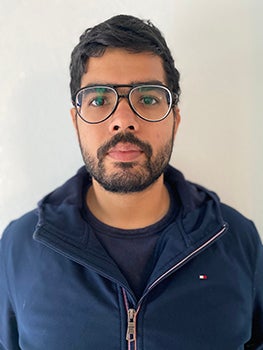India native Dibya Mishra came to Rice by way of an academic and professional career in engineering, business, and banking. After deciding to make a transition, Mishra, who held an MBA, received a master’s degree in econometrics on a full ride scholarship from the London School of Economics. He also worked at a university in India, focusing on development and health. Because of his experiences, Mishra felt comfortable with many concepts of finance, and he wanted to learn more about economics.
“I decided to attend Rice because it has a small PhD program in economics, which gives graduate students the opportunity to get to know almost all the faculty members,” said Mishra, adding, “There's no competition for resources, to put it in economic terms.”
Mishra’s upbringings fostered his interests in healthcare economics. His parents and brother are doctors, and he remembers growing up having many conversations with his family about healthcare. In India, Mishra passed his entrance examinations for both engineering and medical school. Today, Mishra’s research sits at the crossroads of healthcare, markets, industrial organization, and applied microeconomics.
“If you consider the last time you thought about any healthcare choice, you would have taken some time to figure it out,” said Mishra. He continued, “That to me is very interesting because it allows us to understand that it's not a very straightforward decision to make. There are a lot of trade-offs, and that's where economics can really help maximize utility over scarce resources.”
Utilizing quantitative methods to tackle policy-relevant questions, Mishra’s research is situated in both the United States markets and the India markets, which provide a range of data. In the U.S., healthcare is continuously being formalized, whereas in the newer markets of the developing country of India, healthcare issues are dealt with differently. The Indian healthcare system has undergone a transformation, Mishra explained, wherein the government aims to provide universal healthcare coverage, with zero premiums or minimal premiums, subsidizing a large percentage for people below a certain income level, similar to Medicaid in the U.S.
In exploring the design of optimal healthcare policies, Mishra is working on a solo-authored paper and a collaborative paper with co-authors in the U.S. and India, where they are researching the influence of information on patient choices.

“Through the research, we’ve found that patients are not well informed, and they can sometimes make counterintuitive choices,” said Mishra. He continued, “The program could be made more efficient if patients are better informed. Healthcare is quite complicated, and providing the right amount of information could really help.”
Mishra is working to demonstrate in his solo paper that providing more information can improve welfare using a quantitative decision-making model. In the second paper, the co-authors aim to determine if reimbursement policies should be geographically homogeneous or modified based on proximity to an urban center.
In addition to these papers, Mishra recently received a grant from the Social Sciences Research Institute (SSRI) to explore the drivers behind increased consolidations in U.S. healthcare markets, where small hospitals are merging with large hospitals, and large hospital chains are merging with one another. Further, Mishra is also conducting research related to pharmacy competition in India, exploring the impact of subsidizing menstrual products in government pharmacies, menstrual health management, menstrual health education, and labor outcomes of women.
“My research on healthcare economics is centered around access, improving the inefficiencies in healthcare markets, and enhancing the decision-making of individuals,” said Mishra.
After graduation, Mishra plans to continue to conduct research in an academic setting. The economics PhD program has taught him that there is always more to learn, and he looks forward to a lifetime of learning.
When asked what advice he would give to potential PhD economics students, Mishra sad, “If you're somebody who likes to look at a problem and try to model behavior or figure out why people make certain decisions, this program is a great option. The School of Social Sciences has a fantastic economics department. It is small and very close-knit, which has been a big plus for me.”
Mishra has also been happy with Rice’s location in Houston, noting its cultural diversity.
“Not only can I easily get Indian food, but I’ve also been able to experience other cultures and their foods,” said Mishra. He added, “I’ve made friends here from around the world, which is something Rice definitely promotes. Meeting new people might not seem helpful when you're preparing for a career, but if you're an economist, when you meet new people and get to know their points of view, that actually makes you a much better researcher.”

